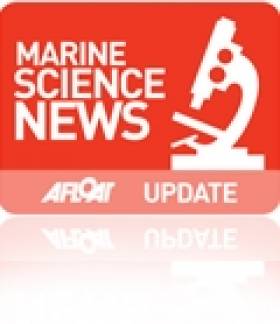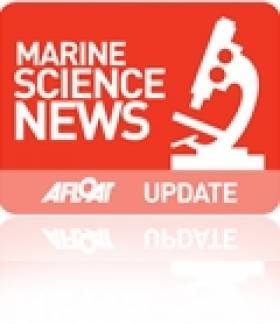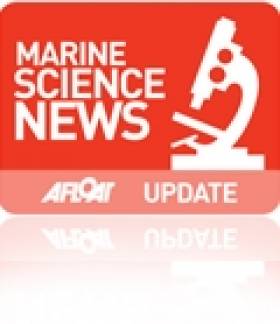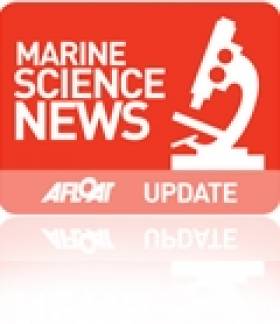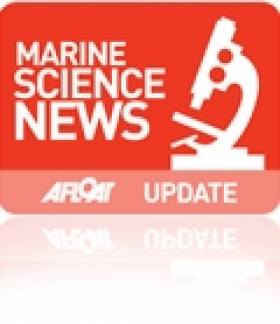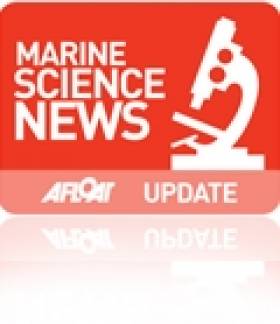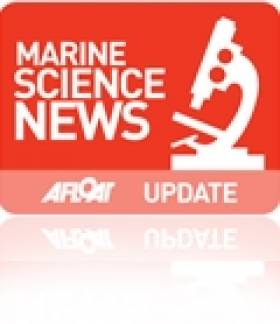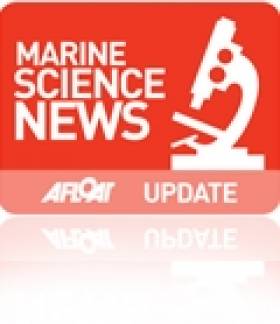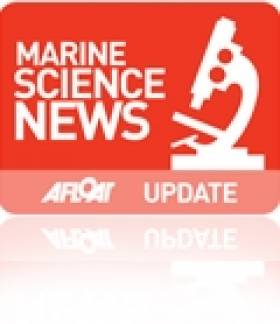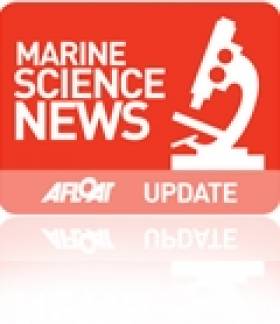Displaying items by tag: Marine Institute
#MarineScience - The Marine Institute has carried out Ireland's obligations under the Data Collection Framework (DCF) since 2002. The DCF programme involves at-sea and port sampling of catch and landings, research vessel surveys (eg acoustic, egg, groundfish and underwater TV surveys), management and analyses of data, assessment and provision of scientific advice on the sustainable exploitation of fisheries resources.
Ireland has secured funding under the EMFF (European Maritime and Fisheries Fund 2014 to 2020) to support the implementation of the new DCF and to build capacity in the areas of Regional Fisheries Management Plans; Mixed Fisheries Plans and Regional Discard Plans; in addition to discard and groundfish survey data analyses.
To support delivery of these work programmes the Marine Institute is recruiting two posts: a Team Lead (TL) focused on providing fisheries modelling and simulations support for Regional Fisheries Management Plans; Mixed Fisheries Plans and Regional Discard Plans; and a Scientific and Technical Officer (STO) to work with our Fisheries Ecosystem Advisory Services (FEAS) team to focus on the analyses of discard and groundfish survey data.
The TL will provide statistical support for staff in relation to analyses of data for peer reviewed publications as well as develop assessment methods for data limited stocks particularly monk and megrim in ICES Sub Areas VI and VII.
If you have an interest in working with the FEAS team and believe you have the skills and experience required for either of these roles, then the the Marine Institute would like to hear from you.
Further information about the opportunities can be found in the detailed job descriptions that be downloaded from www.marine.ie.
Please send a detailed letter of application and an up-to-date CV to Human Resources, Marine Institute, Rinville, Oranmore, Co Galway or email to [email protected]. Please note email applications will only be accepted at this address and applications are not valid until you have received confirmation of your application. All applications should include the reference for the relevant vacancy.
The closing date for receipt of applications is 5pm on Wednesday 21 January 2015. Late applications will not be accepted. The Marine Institute is an equal opportunities employer.
Irish Marine Scientists Win €5.5m in EU 'Blue Growth' Research Funds
#marinescience – Ireland's marine researchers have won €5.5m in the latest EU Horizon 2020 competitive funding in the areas of Blue Growth and Sustainable Food and Security.
This represents 4.7% of total EU budget awards and 5% of Blue Growth, a much higher success rate than the 'normal' ratio for Ireland in competitive European funding calls.
Welcoming the success of Ireland's marine research community Dr Peter Heffernan, CEO Marine Institute said:
"Ireland's marine researchers are performing really well, with 12 out of 36 projects with Irish partners funded and a further 15 qualifying to be considered for funding. This shows that marine science is being carried out to the highest standards across State, third-level and SME sectors. The Government's marine strategy - Harnessing Our Ocean Wealth is paying dividends."
Irish research bodies will coordinate three significant projects. One of these projects will see the Marine Institute play a pivotal role in the implementation of the Galway Statement on Atlantic Ocean Cooperation.'
The 'Galway Statement' was signed at the Marine Institute, Galway 24 May 2013 by representatives of the European Union, the Government of Canada and the Government of the United States of America. It is a strong commitment from the EU, US and Canadian Governments to align our ocean observation efforts to improve ocean health and stewardship and promote the sustainable management of our shared marine resources.
A European Commission workshop in Dublin Castle today (Tuesday 2nd December) marks a key step in the implementation of the Galway Statement focussing on Atlantic seabed mapping. EU, US and Canadian participants are working to establish key priorities and approaches for targeted seabed mapping to support ocean observation and forecasting capabilities.
Dr Heffernan added, "It's exciting to see the Atlantic research alliance gather momentum and Ireland has much to bring to this partnership, and much to gain. We have a strong marine research community supported by growing national research infrastructure. This is in addition to our expertise in seabed mapping developed through INFOMAR, the national seabed mapping programme which the Marine Institute carries out in partnership with the Geological Survey of Ireland."
"The gains for all are clearly stated in the 'Galway Statement': " ...an Atlantic Ocean that is healthy, resilient, safe, productive, understood and treasured so as to promote the wellbeing , prosperity and security of present and future generations" ".
Hundreds Of TY Students Visit Marine Institute For Science Fest
#MarineScience - Over 300 Transition Year students from Galway and further afield visited the Marine Institute yesterday (Thursday 20 November) as part of the Galway Science & Technology Festival.
The students met scientists and staff, discovered the wide ranging work of the Marine Institute and got a glimpse of what it would be like to work in marine research.
“We’re delighted to open our doors to students today and we hope they’ll be inspired by the people they meet here and by the work that we’re doing to understand our unique ocean resources," said Marine Institute chief executive Dr Peter Heffernan.
"Some of the students may even go on to become ocean explorers as marine biologists, oceanographers, geographers, mapping the seabed or as engineers, developing novel marine renewable energy devices."
Dr Heffernan also hailed the "many opportunities, particularly with a national and EU focus on the potential of the ‘blue economy’ with the Government plan Harnessing Our Ocean Wealth and the European Commission’s Atlantic Strategy.”
The visit included a talk by Helen McCormick of the Fisheries Ecosystem Advisory Services on the work of the Marine Institute, a 'Sea for Society' video showing the importance of our ocean resource, and an exhibition on marine careers and training opportunities, including the institute's own annual bursar programme for third level students.
Staff and scientists demonstrated their work using touchscreen interactive seabed maps, fish samples and even a mini submarine. They answered well thought-out questions on their work in fisheries science, seabed mapping, seafood safety, oceanography, ocean chemistry and research vessel operations.
For more information on the Galway Science & Technology Festival see www.galwayscience.ie or learn about the Marine Institute at www.marine.ie.
New US Ambassador to Ireland Visits the Marine Institute
#USambassador- The newly appointed US Ambassador to Ireland, Kevin O'Malley met with Dr Peter Heffernan, CEO of the Marine Institute last week at the headquarters of the institute in Oranmore, Co. Galway.
Dr Heffernan highlighted the strong marine transatlantic relationship Ireland has with the USA.
Particular reference was given to the Galway Statement on Atlantic Cooperation that was signed in Oranmore back in 2013 by the USA, Canada and the EU.
The Galway Statement highlighted the effort to align our ocean observation efforts to improve ocean health, stewardship and to promote the sustainable management of its resources.
Open Day For TY Students At The Marine Institute
#MarineScience - As part of the Galway Science & Technology Festival 2014, Transition Year students are invited to visit the Marine Institute in Oranmore, Co Galway during a special open day on Thursday 20 November.
TY students will be given a brief introduction to the Marine Institute in its auditorium with a talk about marine science in Ireland.
They will then be invited to meet the Marine Institute's scientists and see their work through a series of exhibitions – including marine environment, fisheries, seafood safety, seabed mapping, research vessel operations and oceanography – as well as getting information and advice on marine careers from the institute's HR team.
These visits will last for about 90 minutes and can be booked in any of three time slots, from 10am till 11.30am, 11.30am till 1pm and 1.30pm till 3pm.
Places are limited and will be booked on a first come, first served basis. Schools are responsible for organising transport. To book a place for your TY students email [email protected].
Marine Institute Brings Underwater TV Survey Tech To Bay Of Biscay
#MarineScience - The first underwater TV (UWTV) survey of the Bay of Biscay Nephrops grounds was carried out on the RV Celtic Voyager from 20-29 September.
This survey involved collaboration between the fishing industry and IFREMER, the French equivalent of the Marine Institute. The Celtic Voyager was chartered for this survey by the French fishing industry (CNPMEM).
The team of French scientists from Lorient were trained in the UWTV survey methodology by Jennifer Doyle, an expert from the Marine Institute. A fishing industry observer also participated in the survey.
This was the furthest south that the Irish Celtic Voyager research vessel has been to at 45°55′N 2°22′W.
The Bay of Biscay Nephrops grounds, known locally as 'la Grande Vasière', have an area of approximately 11,600 sqkm and support landings of Neprophs (better known as Dublin Bay prawns or langoustines) of around 4,000 tonnes annually.
During the 10-day survey, 160 UWTV stations were successfully completed with an average depth of 100 metres. At each station a sled-mounted camera system is towed at 1 knot. This allows for the detailed examination of the sea bed. The Nephrops burrows on the video footage collected are identified and counted by trained and experienced scientists.
Weather conditions throughout were perfect for TV operations with light winds, little or no swell and sea surface temperature around 20 degrees C. The visibility at the seabed was also excellent. The results from this survey will be analysed by IFREMER scientists to determine stock abundance.
The Marine Institute have been developing UWTV survey methods and technology since 2002. Since then, survey coverage has been expanded: in 2014 the main Nephrops stocks fished in Irish waters are have all been fully surveyed – Aran Grounds, Porcupine Bank, Western Irish Sea, Eastern Irish Sea, South Coast, Smalls, Labadie, Jones and Cockburn Banks.
These UWTV surveys form the cornerstone of the ICES assessments and management advice. The results of the TV surveys directly form the basis of the catch options.
All UWTV Marine Institute surveys reports are available online in the Marine Institute's open access repository.
Legacy Report Concludes Four-Year European Marine Research Programme
#MarineScience - The recent publication of the SEAS-ERA Legacy Report brings to a successful conclusion the four-year work programme of the SEAS-ERA Network, a consortium of 21 European marine research funding organisations (RFOs) from 18 member and associated member states.
Key SEAS-ERA deliverables included the preparation of a vision and the identification of priority research issues to be addressed in each of the three sea basins studied: the Atlantic, the Mediterranean and the Black Sea.
The Atlantic Sea Basin Working Group, led by Ireland's Marine Institute and the European Marine Board, included partners from 10 of the 11 European Atlantic seaboard countries (excluding Denmark) stretching from Norway andIceland in the north to Spain and Portugal in the south.
Key deliverables of this group included a draft Marine Research Plan for the European Atlantic Sea Basin discussion document in October 2011; a summary report on Marine Research Infrastructures in the Atlantic Region in October 2012); and Towards a Strategic Research Agenda/Marine Research Plan for the European Atlantic Sea Basin in November 2013.
“The SEAS-ERA Project has made a significant contribution to identifying agreed marine research priorities to be addressed in the Atlantic Sea Basin," said Geoffrey O’Sullivan of the Marine Institute. "This work has fed into the EU Atlantic Strategy (2011) and the Regional Atlantic Fora Workshops (2012-2013) which in turn informed the EU Atlantic Action Plan (2014-2020).
"The priority research topics identified in the EU Atlantic Action Plan are also consistent with national marine policy (Harnessing Our Ocean Wealth) and topics identified for transatlantic EU-USA-Canada Marine Research Co-operation as defined in 2013 in the Galway Statement on Atlantic Ocean Co-operation.
"These priority topics provide an agenda for co-operative EU (HORIZON 2020, INTERREG-V, etc) and member state marine research funding programmes over the period 2014 to 2020”.
For further information on the SEAS-ERA project and to download SEAS-ERA reports visit www.seas-era.eu.
Impressive €70m In EU Marine Grants for Irish Science Projects
#marineinst – In the six years between 2007-2013, 111 Irish research groups (including SMEs) have participated in 210 competitive EU-funded marine projects; winning over €70 million in grant-aid.
"These figures", said Marine Institute, Chief Executive, Dr Peter Heffernan, "are even more impressive when one realises that the drawdown by the Irish marine research community (€48 million) from the prestigious Framework 7 Programme (2007-2013) represents a very significant proportion of the national FP7 drawdown (€600 million) across all sectors and that Irish participation in EU funded marine projects (e.g. FP7, INTERREG-IV, etc.) supports over 220 marine science based positions".
The recently published New Connections II (2014), along with its predecessor New Connections (2011), illustrate the success of the Irish marine research community in competitive EU-funded programmes over the periods 2007-2010 and 2011-2013 respectively.
Together, they represent a directory of Irish participation in cooperative EU funded research, development and innovation projects, describing the research undertaken, identifying those innovative Irish marine researchers, from the public and private sectors, who work at the frontiers of marine knowledge and fly the flag for Ireland as an island of research and innovation and a gateway to the North Atlantic.
Irish marine policy, Harnessing Our Ocean Wealth (2012), is now well aligned with EU Maritime Policy (e.g. EU Strategy for the Atlantic (2011) and the EU Atlantic Action Plan (2014-2020) and the implementation of EU Maritime Policy, including research, will be supported by EU competitive funding programmes; including Horizon 2020, INTERREG-V, LIFE and EMFF. "This", said Dr Heffernan, "represents a great opportunity for Ireland".
New Connections II (2014): A Review of Irish participation in EU Marine Research Projects 2011-2013.pdf is available to download from the Marine Institute website: http://hdl.handle.net/10793/980
SMARTSkills Workshop For Marine Researchers In Galway This Month
#MarineScience - The Strategic Marine Alliance for Research and Training (SMART) and the Marine Institute will host a one-day SMARTSkills 2014 workshop on Wednesday 27 August in Oranmore, Galway.
This workshop is aimed at preparing early-stage researchers in developing successful proposals in order to secure shiptime in 2015 on the national research vessel RV Celtic Voyager.
The 2015 competitive shiptime call will make available 30 days on board the RV Celtic Voyager in mid-summer 2015 for graduate, postgraduate and postdoctoral led surveys.
This presents an opportunity for emerging marine scientists to design, plan, secure funding and lead a research survey that will contribute data to current research programmes as well as further developing the skills, knowledge and expertise required for a career in ocean research.
The workshop will specifically focus on the following areas:
- Upcoming 2015 shiptime call and online application procedure
- Available infrastructure, equipment and instrumentation
- Developing successful shiptime proposals and tips for success
- Planning and designing a research survey at sea
- Supports for gaining offshore experience and skills
- Break-out sessions and networking for multidisciplinary collaborations
SMARTSkills 2014 will take the form of a colloquium for presentations and networking. Participants will have the opportunity to introduce themselves and their research interests through flash presentations (two minutes, one slide) to facilitate networking.
Focused break-out sessions will stimulate discussions amongst peers and meld these goals into potential collaborative multidisciplinary surveys or complementary shiptime proposals based on disciplines or study areas.
And a ‘proposal surgery’ will allow expert scientists to analyse and advise on preliminary shiptime proposals and input on survey plans.
Registration for this workshop is free and open to all marine-related graduate, postgraduate and postdoctoral students from across the island of Ireland. Registration forms should be submitted no later than Thursday 21 August.
A draft workshop schedule is available, as are practical logistical instructions on travelling to the Marine Institute and participating in the workshop.
For further details contact the SMART team at [email protected].
Marine Institute Bursary Programme Highlighted
#marinescience – Twenty-two 3rd level students highlighted the value of the Marine Institute bursary programme at the annual Bursar Seminar day recently (24th July) where they show cased their skills and experience gained at the Institute.
The Marine Institute Bursary programme this year provided work experience for students from seven different third level Institutes and universities across Ireland, in a range of areas including: fish and shellfish assessments and surveys, corporate communications, sampling salmon and commercial fisheries in ports, assessments of maritime economics and oceanographic technology development.
Speaking about the value of the Marine Institute Bursary Programme, Dr Peter Heffernan, CEO of the Marine Institute, said "this year the students have clearly demonstrated their understanding and skills developed over the summer and am confident that this group of marine scientists will continue to ensure Ireland retains its high reputation in developing a strong marine sector.
It is encouraging to also see the students understand the value of engaging and promoting their work and the marine through story-telling and the use of imagery when giving presentations. Developing these skills will help foster a deeper understanding of the value of the marine."
Bursary students came from the following third level institutes: NUI Galway, Dublin City University, Dundalk Institute of Technology, University College Cork, Sligo Institute of Technology, Institute of Technology Tralee, Galway-Mayo Institute of Technology.


























